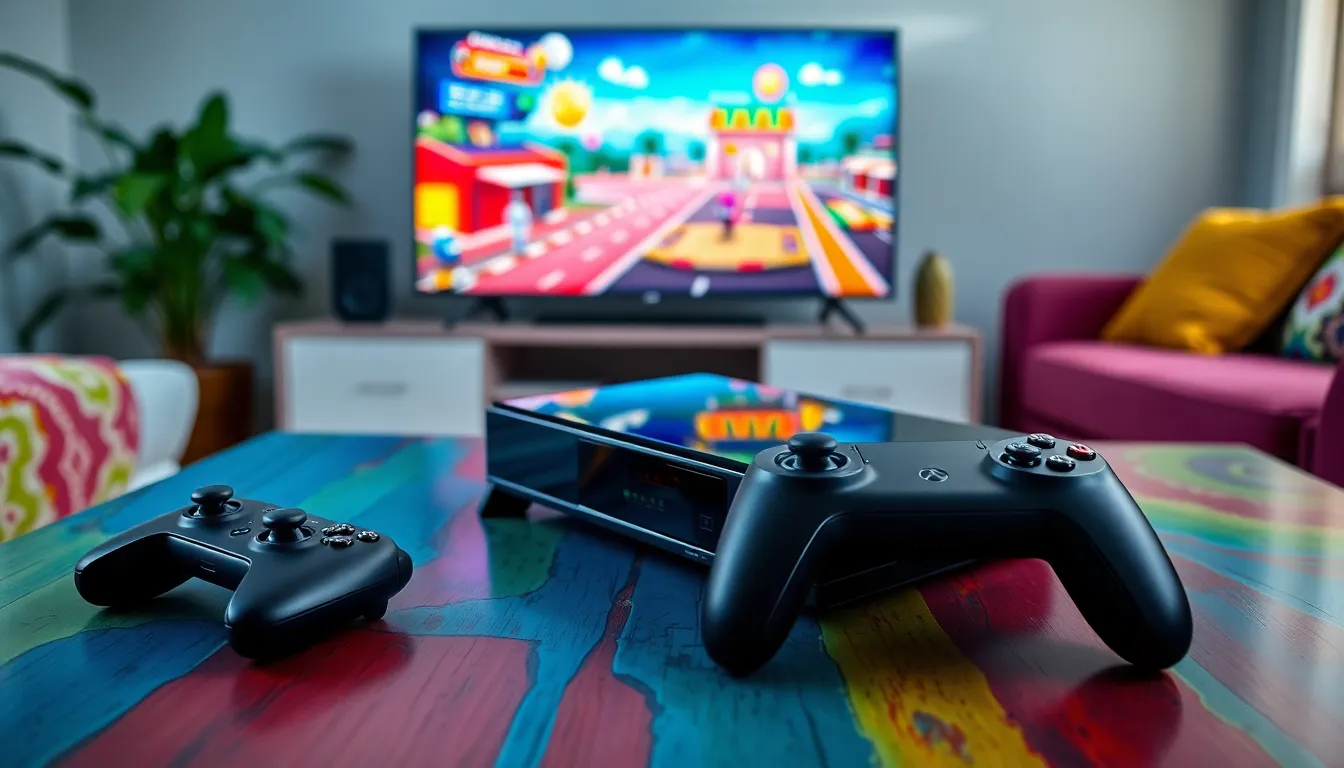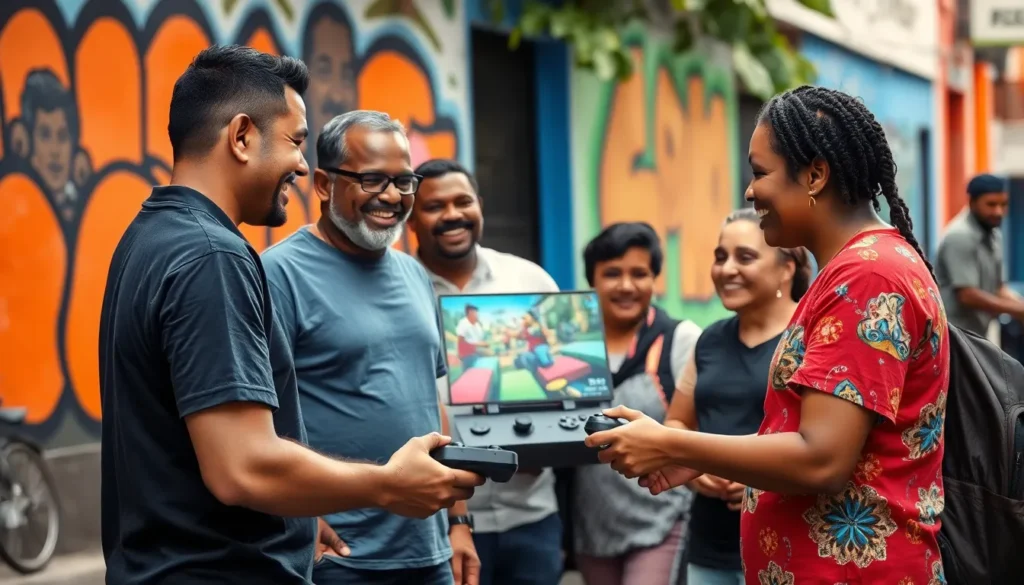In the vibrant landscape of Brazilian gaming, Zeebo Brasil stands out like a carnival parade—colorful, exciting, and a bit quirky. Launched in 2010, this innovative console aimed to bring gaming to the masses, especially in regions where traditional gaming systems seemed as rare as a snowstorm in Rio. With its unique approach and a library of engaging titles, Zeebo Brasil made waves, proving that gaming can thrive in unexpected places.
Imagine a world where gaming isn’t just for the elite but for everyone, from the beach-loving surfer to the bustling city dweller. Zeebo Brasil made that dream a reality, blending technology with local culture in a way that had gamers laughing and playing together. So, buckle up as we dive into the fascinating journey of Zeebo Brasil, where nostalgia meets innovation in the most entertaining way possible.
Table of Contents
ToggleOverview of Zeebo Brasil
Zeebo Brasil, launched in 2010, represents a significant shift in the Brazilian gaming industry. Designed to make gaming more accessible, this console targeted regions where traditional systems were difficult to obtain. Bridging technology and local culture, Zeebo Brasil delivered a unique gaming experience that resonated with a diverse audience.
Players enjoyed various games that reflected Brazilian themes and preferences. Additionally, the console featured a built-in 3G connection, allowing users to download games without the need for broadband internet access. This innovation catered to areas with limited connectivity, broadening its appeal.
The development team behind Zeebo Brasil focused on affordability, ensuring that the console remained budget-friendly. Pricing strategies aimed to attract families and casual gamers, fostering a gaming environment previously inaccessible to many.
Local game developers played a crucial role in enriching Zeebo Brasil’s library. Engaging with the community enabled the creation of content that spoke to Brazilian culture and interests. Their contributions made gaming feel more inclusive for various demographics, from urban youth to rural families.
Additionally, the console’s design emphasized user-friendly navigation, appealing to players of all skill levels. Gamers appreciated the intuitive interface, which simplified game selection and play. Zeebo Brasil’s commitment to an engaging experience established a solid foothold in the market.
Zeebo Brasil’s impact on the gaming landscape continues to be evident, as it inspired future innovations in gaming accessibility and community engagement.
Features and Specifications

Zeebo Brasil presented a range of unique features tailored to enhance the gaming experience for users in Brazil. Details of its hardware components and software capabilities highlight its innovative approach.
Hardware Components
The console integrated essential hardware features designed for efficiency and accessibility. A built-in 3G connection allowed users to download games directly, eliminating the need for broadband internet access. Connectivity proved vital in regions with limited internet service. Zeebo Brasil included a modest processing unit, enabling gameplay at adequate performance levels. The console’s output displayed games in a resolution suitable for various television models, ensuring broad compatibility. Additionally, controllers offered an ergonomic design, allowing comfortable use for extended gaming sessions.
Software Capabilities
Zeebo Brasil showcased noteworthy software features, focusing on both usability and content variety. Navigation through its user interface remained intuitive, appealing to players regardless of their experience level. Offering a library of games tailored to Brazilian culture enriched user engagement. Local developers contributed significantly, ensuring the content resonated with diverse audiences. The console supported downloadable content, enabling users to expand their gaming library easily. Furthermore, continuous updates maintained optimal performance, ensuring players received enhancements and new features over time.
Game Library
Zeebo Brasil features a diverse game library that highlights its mission to engage a wide audience with culturally relevant titles. From local developers to popular gaming trends, the collection supports the console’s appeal to various demographics.
Notable Titles
Notable titles in the Zeebo Brasil library include “Tropico,” which allows players to build and manage their own island paradise, and “Zumbi,” a game rooted in Brazilian folklore that immerses players in local narratives. “Futebol” brings soccer to life, captivating fans with its realistic gameplay and vibrant graphics. Each of these games showcases the console’s design focus on entertainment that resonates with Brazilian culture, contributing to widespread appeal.
Exclusive Releases
Exclusive releases further enhance the Zeebo Brasil experience. For instance, “Bingo,” a unique twist on the traditional game, captures attention with its fun, competitive format. “Zebot,” another exclusive, engages younger audiences with colorful graphics and simple controls. These games not only attract local players but also reinforce the platform’s commitment to accessibility and cultural relevance within the gaming community.
User Experience
Zeebo Brasil delivered a distinctive user experience, effectively appealing to a variety of players. The unique attributes of its design contributed to its popularity within the Brazilian gaming community.
Graphics and Performance
Graphics performance stood out, given the console’s modest processing unit. Players enjoyed bright visuals that complemented the engaging gameplay. Although not at the level of contemporary consoles, graphics provided enough appeal, especially for casual gamers. Developers optimized their games to run smoothly on Zeebo, allowing for minimized lag and improved user experience. Overall, the balance between performance and visual output met the expectations of its target audience.
User Interface and Accessibility
User interface design emphasized intuitiveness. Navigation proved simple, allowing players to easily locate games and settings. Accessibility features catered to individuals with varying skill levels. The layout encouraged exploration and discovery, allowing first-time users to seamlessly engage with the console. Additionally, built-in 3G connectivity enhanced accessibility by enabling game downloads without broadband, breaking down barriers for users in underserved regions. Overall, the interface fostered an inclusive environment, making it easy for everyone to enjoy gaming.
Market Impact
Zeebo Brasil significantly altered the Brazilian gaming market landscape. By creating an affordable gaming option, it captured the attention of diverse demographics.
Competition Analysis
Competing consoles, such as PlayStation and Xbox, often focused on high-end performance, leaving a gap for budget-friendly solutions. Zeebo Brasil positioned itself strategically, appealing to underserved markets where traditional gaming systems remained inaccessible. Its unique 3G connectivity served as a competitive advantage in regions with limited internet access. Local developers contributed content tailored to cultural preferences, differentiating it from global competitors. By fostering a local ecosystem, Zeebo Brasil managed to carve out a niche distinct from established names.
Sales and Popularity
Sales figures indicated strong initial interest, with over 100,000 units shipped within the first year. Popularity surged in urban and rural areas alike due to its affordability and locally relevant game library. Engaging titles like “Futebol” and limited exclusive releases attracted casual gamers and families. Moreover, the consoles supported community events that further boosted visibility and user engagement. Game developers noted a steady demand for new releases, reflecting sustained interest among players. The accessibility factor played a vital role in solidifying its position in the market, contributing to an enduring legacy in Brazilian gaming culture.
Zeebo Brasil’s impact on the gaming landscape in Brazil is undeniable. By prioritizing accessibility and cultural relevance, it opened doors for countless players who might have otherwise been excluded from the gaming experience. The console’s innovative features like built-in 3G connectivity and a diverse library of locally developed games created a unique niche in a competitive market.
Its user-friendly design and affordability made it a favorite among families and casual gamers. The legacy of Zeebo Brasil continues to influence the industry, highlighting the importance of catering to underserved communities. As gaming evolves, the lessons learned from Zeebo Brasil’s journey remain relevant, showcasing the power of inclusivity in technology and entertainment.





